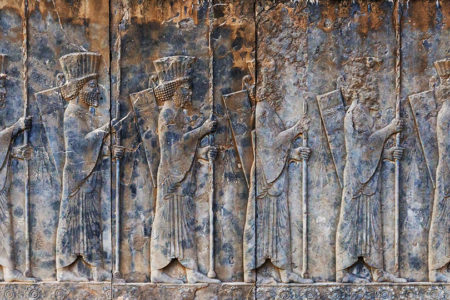The Ten ‘Lost’ Tribes Weren’t Lost
The phrase the lost tribes of Israel emits a certain ring of mystery that romanticizes the disappearance of the Israelites taken captive by Assyria in 722 B.C. Although the phrase is nowhere in Scripture, it is indispensable to a false teaching known as British-Israelism.
British-Israelism, or Anglo-Israelism, came into existence more than 150 years ago. Richard Brothers (1757–1824), an Englishman, is given the dubious distinction of originating this method of biblical interpretation. It is a theological anti-Semitism that contends the AngloSaxon people are, in fact, Israel and, consequently, the true heirs of all of God’s promises to the Jewish nation.
British-Israelism rests on four erroneous postulates:
The Four Main Falsehoods
1. Not a single Israelite remained in the land after Assyria deported the ten northern tribes of Israel.
It is essential to British-Israelism that this statement be historically true. Furthermore, none of the Israelites thereafter could have mixed with Judah or returned to the southern kingdom. Accordingly, British-Israelism teacher Herbert Armstrong (1892–1986) stated, “When the southern kingdom of Judah was taken into captivity by Nebuchadnezzar of Babylon, the Assyrians had migrated northwest— and the ten-tribed Israelites with them! Utterly lost. They were utterly gone! They were lost from view!”
Again he declared, “The house of Israel did not return to Palestine with the Jews in the days of Ezra and Nehemiah, as some erroneously believe.” With the decline of the Assyrian Empire, he said, the tribes began to wander westward across northern Europe and eventually lost their identity. Later they became the Saxe, or Sythians, who subsequently moved through Europe and eventually invaded England as the Saxon people.
2. The British are Israelitish Ephraim, with the fledgling United States later installed under the mantle of Manasseh, thus fulfilling Jacob’ s prophecy regarding Joseph’s two sons in Genesis 48.
In this relocation process, David’s throne was supposedly transferred from Jerusalem to England. Armstrong endorsed a concept by Herman L. Hoeh: “Elizabeth II actually sits on the throne of King David of Israel—that she is a direct descendant, continuing David’s dynasty—the very throne on which Christ will sit after His return.” Other devotees identify biblical Bethel with Glastonbury, England, and Jerusalem with Edinburgh, Scotland.
3. Israel (the ten northern tribes) is forever distinguished from the house of Judah (Jews), which has been left under a permanent curse emanating from the idea that it was Judah and Levi who put Christ to death saying, “His blood be on us, and on our children” (Mt. 27:25).
Therefore, say British-Israelism advocates, the terms Israel and Jews or Judah are never used synonymously in the Bible. When Israel is referred to, it always indicates the ten northern tribes; Jews or Judah are exclusively the southern tribes.
4. All of the divine promises to Israel find fruition in God’s blessings on England and America, which will prepare the kingdom and deliver it to Jesus Christ. The occupant of the throne of England will relinquish the seat of authority to Christ, thus completing the process of the restoration of Israel.
The Biblical Truth
To begin with, Israel was never lost! Certainly , the Jewish people have wandered far and wide across the face of the earth, and evidences of their religion and culture have been deposited and endure. However, to cite these evidences as confirmation of the BritishIsrael hypothesis is preposterous.
The Scriptures and corroborating historical records widely confirm that the majority of the northern tribes’ population never left Israel at all. Ephraim and Manasseh did not move to England and America, portions of the northern tribes were assimilated by Judah, and Israel and Judah eventually fused as one national entity.
All Israel Was Not Taken Captive
Israel’s demise and subsequent deportation are recorded in 2 Kings 17. The chapter, however, lacks specifics concerning who was carried away by Assyria.
It is claimed that the statement “the Lord was very angry with Israel, and removed them out of his sight; there was none left but the tribe of Judah only” (v. 18) suggests the nation was removed in its entirety. However, this verse must be applied contextually, like such statements as “all Israel went to battle” and “all Israel appeared before the Lord.”
All of Israel did not go to battle; only the military went. Nor did every Israelite appear before the Lord; only those who constituted a proper representation appeared. So it was in the case of Israel’s going into captivity.
Other Scriptures confirm the deportation was partial and restricted to the ruling political and military class. In fact, during the reign of Judean King Hezekiah who came to the throne in 715 B.C., seven years after Sargon II of Assyria conquered Israel, many from the north moved to Judah at Hezekiah’s invitation (2 Chr. 30).
In 622 B.C., more Israelites came to Jerusalem to help repair the Temple. Even later, Hezekiah issued a Passover invitation from “Beer-sheba even to Dan . . . throughout all Israel and Judah” to the “children of Israel . . .
who are escaped out of the hand of the kings of Assyria” (2 Chr. 30:5–6). In response, many came to Jerusalem, “even many of Ephraim, and Manasseh, Issachar, and Zebulun, had not cleansed themselves, yet did they eat the passover” (2 Chr. 30:18). Also, “all the congregation of Judah, with the priests and the Levites, and all the congregation who came out of Israel” (2 Chr. 30:25) participated in the feast.
Eighty years later, Josiah led Judah through a period of religious revival. In the process of repairing the Temple, monies were collected from “the hand of Manasseh and Ephraim, and of all the remnant of Israel, and of all Judah and Benjamin” (2 Chr. 34:9). By then many pious Jews from the northern kingdom had moved to Judah to escape contamination from the heathen people the Assyrians had settled in Israel.
Further documentation of this partial deportation comes from Sargon II himself: “I besieged and conquered Samaria, led away as booty 27,290 inhabitants of it.” Estimates of the northern kingdom’s population at that time range from 400,000 to 500,000, meaning only 5 percent of the population was deported, primarily the leaders from the area around Samaria.
The captives settled to the northeast, around the Tigris and Euphrates Rivers. In 612 B.C. the Babylonians under Nabopolassar destroyed the Assyrian capital of Nineveh. Thus the northern exiles joined their Judean brothers under the rule of the Babylonians and later the Persians. Some were among those who returned to Jerusalem in the days of Ezra and Nehemiah. Cyrus, king of Persia, ruled the territories formerly held by the Assyrians. He decreed that all Jews “throughout all his kingdom” who wished to return and help rebuild the Temple in Jerusalem were free to do so. At the dedication that followed the exiles’ return, Scripture records,
And the children of Israel, the priests, and the Levites, and the rest of the children of the captivity, kept the dedication of this house of God with joy, And offered at the dedication . . . twelve he-goats, according to the number of the tribes of Israel (Ezra 6:16–17).
The New Testament records that individuals in the first century still maintained their tribal identities— some of whom were members of the so-called lost tribes. For example, Anna, who beheld the baby Jesus in the Temple, was “of the tribe of Asher” (Lk. 2:36).
Israel unquestionably remained in the region of its inheritance without a massive and mysterious exodus into Europe.
Synonymous Terms
With the Babylonian Captivity came the dissolution of a dual national identification for Israel. The divided kingdom ceased to exist, and Israel and Judah became synonymous terms frequently used to identify the entire host of Jewry.
British-Israelism heatedly denies this indisputable fact because its entire system of interpretation hinges on its being correct on this point.
Walter Martin, in his book Kingdom of the Cults, fully exposed this fallacy: “After the Babylonian captivity, from which the Jews returned, Ezra records the remnant were called by the name of Jews eight times, and by the name Israel forty times. Nehemiah records eleven times they are Jews, and proceeds to describe them as Israel, twenty-two times.”
The New Testament is no less emphatic. At Pentecost, Peter addressed himself to “all the house of Israel” (Acts 2:36). In this one chapter alone, “Jews” (v. 5), “men of Judea” (v. 14), and “men of Israel” (v. 22) are mentioned, followed by the reference to “all the house of Israel.” Later, referring to his Jewish brethren, the apostle Paul spoke of a common promise and a common hope, “unto which promise our twelve tribes, earnestly serving God day and night, hope to come” (Acts 26:7).
James addressed his epistle “to the twelve tribes which are scattered abroad” (Jas. 1:1).
Walter Martin observed further, “The New Testament used the word ‘Jew’ one hundred and seventy-four times.” The promoters of British-Israelism are shamefully guilty of attempting to manipulate the Bible in order to make an untenable position appear factual.
Ephraim and Manasseh Are Not England and America
Ephraim and Manasseh are prominent in Scripture. They are repeatedly said to have been in Israel following the captivities—not in London or New York. Ephraim is specifically identified and related to God’s future purposes for the Jewish people.
In Ezekiel 37, written during the Babylonian Captivity, the prophet looked forward to the official union of Judah and Israel. He was directed to symbolize this event by placing two sticks together “for Judah, and for the children of Israel…and they shall become one in thine hand” (vv. 16-17). When pressed by the people for an explanation, Ezekiel said,
Thus saith the Lord Goo: Behold, I will take the children of Israel from among the nations, to which they are gone, and will gather them on every side, and bring them into their own land. And I will make them one nation in the land upon the mountains of Israel, and one king shall be king to them all; and they shall be no more two nations, neither shall they be divided into two kingdoms any more at all (vv. 21-22).
The context leaves no doubt that the scattered tribes would return to the Israel of the Middle East. Ephraim shall be gathered “from among the nations, to which they are gone, and [I] will gather them on every side, and bring them into their own land” (v. 21). The people who have been scattered through the torturous dispersion will be gathered out of the nations and brought back to the land of promise. This is a marked contrast to the British-Israel fantasy that has Ephraim at home in his English “Promised Land,” waiting to deliver the kingdom.
Clearly, no dark mystery shrouds the true identity of the Jewish nation. All segments of Jewry are represented in the people historically identified as Jews. British-Israelism is but one more weapon in the satanic arsenal brought on the scene to bring confusion and diversion and to promote anti-Semitism among another generation of professing Christians.






This is another one of those fallacies that I heard of growing up in the church as a christian. I have learned to discount some of what I remember by going to the word myself. This is not the first article that I have read on the subject but it is so well done. Thank you. I especially appreciate the historical reference of the British element. I imagine that the British were not the first to think this throughout history but it certainly gives credible evidence to why it is such a popular misconception in Western thinking. Another is the name change conversion of Saul/Paul. It is clear that he did not change his name at conversion as was commonly taught in Sunday school.
Just to make you aware of a typo on the web page “The Ten ‘Lost’ Tribes Weren’t Lost”. The reference to God on line 520 in the page code is misspelled appearing as “Goo”.
I am in total agreement with the article and find it most enlightening.
Thank you,
Howard
I hear the ancient voices
Other so-called “lost tribes” are given prominence in the New Testament besides Anna of Asher. John the Baptist and his parents were Levites and Paul was of the tribe of Benjamin. Hence just as Mr. McQuaid writes, there are and never been any lost tribes of Israel. God whose eyes are always wide open knows where to regather them from and He has always maintained a remnant of all 12 tribes in Israel. We even have the prophesied 144,000 from the 12 tribes saved after the rapture proclaiming the eternal gospel in the Tribulation. Another counterfeit group lays claim to being the lost 10 tribes, the mormons. They have declared Independence, MO to be the New Jerusalem. So tragic, a whole group of lost souls under the anathema of Galatians 1:6-9